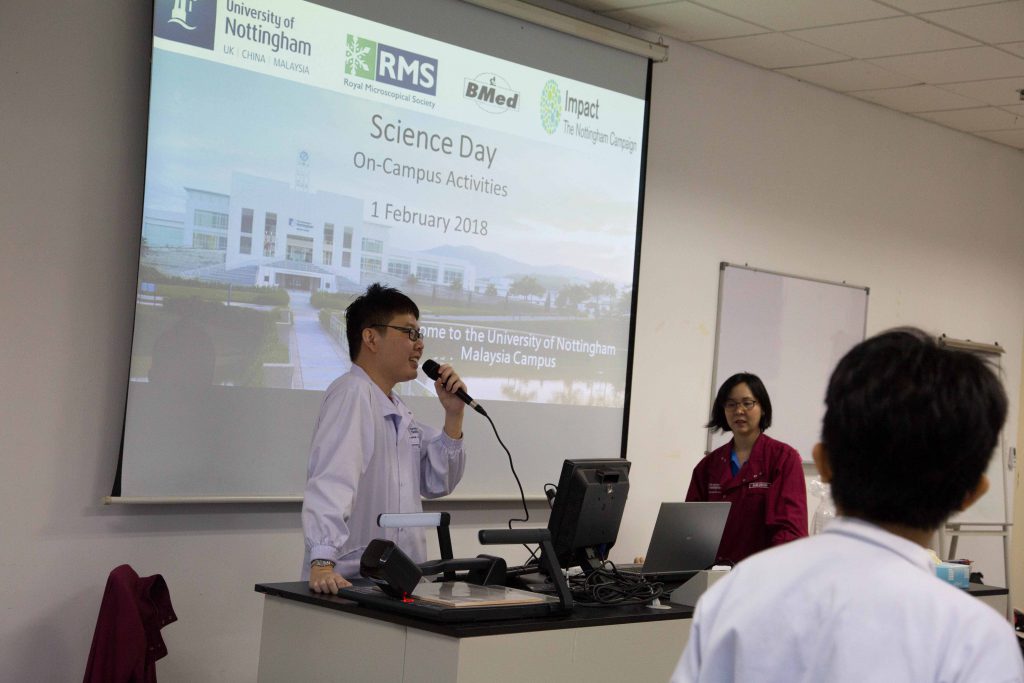
February 22, 2018, by Communications
Science Day
On 1 February 2018, under the project “Promoting Science Using Microscopes”, the Department of Biomedical Sciences together with Biomedical Sciences Society and Rotaract Club hosted a one-day event for students from Selayang Harmony, Sunway Mentari and Manna House Learning Centre. These centres, as registered by the United Nations High Commissioner for Refugees (UNHCR), provide education for refugee children from Myanmar, Pakistan, Jordan and Sri Lanka.
Activities in the lab started at 9.30am when students from all the different centres arrived by transport provided by the host. Students were divided into small groups and each group was supported by a student helper. The students then learned about factors affecting enzyme activities and the crystallisation process. They were taught how to record their observations and convert them into a graphical presentation. Students were also given the opportunity to view some specimens under the microscope which they observed and took notes of the different and similar anatomies of insects and arachnids. The activity ended with the discussion on the different functions of these parts with their student helpers.
Alongside these activities, an eye examination for visual acuity was carried out by a qualified optician. Those who were found to be in need of spectacles were prescribed corrective lenses with their choice of frames. Out of a total of 45 students, 23 were provided with spectacles as gifts by private donors.
Mr Chong Zhi Xiong, a final year undergraduate biomedical science student, had the opportunity to organise and lead the event. He had participated in multiple similar events organised by his department and this event was made possible with the support of other student helpers from the Department and the Biomedical Science Society.
“I feel that volunteering for these events provides a very fruitful and meaningful experience. As a final year student, it can be quite stressful at times and I believe that this is a beneficial distraction as organising and preparing this event gave me the opportunity to hone my time management and multi-tasking skills. Not to mention that I also had the support of Premika and Racheal, the President and Vice-President of the Biomedical Society that ensured the smooth running of the event,” said Zhi Xiong when asked about his experience.
Ms Karen Yu is a volunteer teacher at Sunway Mentari and Manna House who accompanied the students at this event. She expressed that opportunities like these help inspire and further develop the interest of the children in science-based subjects as there are no related facilities or spaces at the learning centres. Ms Karen Yu also added, “as voluntary teachers, science-based subjects requires more technical knowledge and while we do teach them what we can, field trips like these allow for a broader and deeper understanding of science subjects for these students.”
Prof Ting Kang Nee, the lead for this event and project, found that such hands-on activities are crucial to support the learning of science, in particular for learning centres without such facilities. She reckons that science should be fun, children should be encouraged to get their hands ‘dirty’ and explore the world around them more. Prof Ting commended her student helpers who have successfully organised the event and carried out the science experiments with the refugee children. “We must encourage our undergraduate students to reach out more to the local community in particular, the younger generation, in order to promote science as a fun and interesting subject area.”
The organiser would also like to thank Adeline Ting, Priyanka Jagadish, Jagadish Pillai, Sudha Menon, May Lim, Daniel and Trinity Spowage, donors who generously provided the spectacles to the affected students.
For more information, please contact Professor Ting Kang Nee




I am a newbie for this site. “Mr Chong Zhi Xiong” doing great work. I get new information in science day. Thank you for sharing this great news with us.
for this site. “Mr Chong Zhi Xiong” doing great work. I get new information in science day. Thank you for sharing this great news with us.
Thank you here.
Very good post.